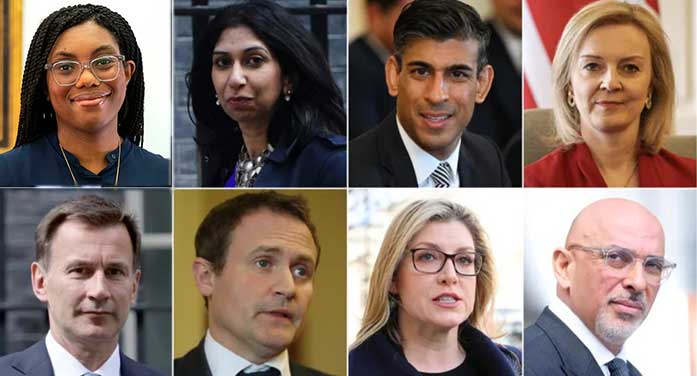 Canadians with a general interest in politics will be watching the current developments in the United Kingdom. They might even feel a touch of envy.
Canadians with a general interest in politics will be watching the current developments in the United Kingdom. They might even feel a touch of envy.
Less than three years ago, Boris Johnson bestrode the British scene like the proverbial colossus. Thwarting the dogged opponents of Brexit – including many in his own party – he won a stunning general election victory on the strength of his personality and the vow to “get Brexit done.” He did, with dispatch.
Now he’s been turfed by his own members of parliament. With Brexit in the bag and Johnson’s personal foibles becoming an electoral albatross, the erstwhile king of the hill has been deposed.
Canadians who are tired of Justin Trudeau may well wonder why something similar can’t happen here. After all, we too have a Westminster-style parliamentary system where prime ministers can be removed without waiting for a general election.
Culturally, though, we’re different, at least where governing parties are concerned. Here, prime ministers dominate their parliamentary parties and their MPs toe the line. Yes, the Liberal parliamentary party could send Trudeau packing – just as Stephen Harper could’ve been evicted by his party before trying for a fourth term in 2015. But don’t hold your breath.
There’s another respect in which Canadians might be surprised at the U.K. Conservatives. The diversity quotient of the leadership candidates is striking.
As of this writing, there are as many as nine candidates with visible support. And no fewer than four of these, including the current front-runner, are what the Brits describe as BAME (Black, Asian and minority ethnic). Statistically, it means that non-whites are substantially overrepresented in the race.
 |
| RELATED CONTENT |
| The final act of Boris Johnson’s political career By Michael Taube |
| Boris Johnson: the man who got Brexit done By Pat Murphy |
| Boris Johnson is a consequential politician By Pat Murphy |
This is grossly at odds with the caricature of the U.K. Conservatives, which paints them as a party of whiteness with a material undercurrent of racism. As generally happens, reality is way more complicated.
Rishi Sunak, the front-runner, is the child of Indian immigrants who came to the U.K. in the 1960s via East Africa. In keeping with his Hindu heritage, he took his parliamentary oath on the Bhagavad Gita.
While Sunak is the man to beat, two others – both women – are particularly interesting. The probability is that 2022 is too early for either to go all the way or even make the later stages. But they’re both young and, barring mishaps, there should be future opportunities.
Kemi Badenoch was born in England to Nigerian parents and once described herself as a “middle-class Yoruba schoolgirl” – Yorubas being one of Africa’s largest ethnic groups. She’s a software engineer by training and first entered parliament in 2017.
Badenoch is also an unequivocal woman of the political right, a strong supporter of Brexit and a staunch admirer of Margaret Thatcher. She’s forthright and unapologetic in expressing her perspective. There’s no timidity there.
Still, her leadership announcement came as a surprise, and initial prognostications deemed her a long shot. But since Conservative heavyweight Michael Gove endorsed her, the bookmakers’ odds have shortened.
Suella Braverman is the daughter of Indian parents who, via Kenya and Mauritius, immigrated to the U.K. in the 1960s. A Cambridge graduate and a barrister by profession, she also acquired a master’s in European and French law during a scholarly sojourn in France. She entered parliament in 2015 and became attorney general in 2020.
Like Badenoch, Braverman is very much on the right-hand side of the political spectrum. And also like Badenoch, she’s not afraid of controversy and doesn’t pull her punches.
Braverman campaigned for Brexit in 2016, is in favour of exercising British sovereignty and has no apparent ambivalence about embracing British history. If you’re looking for the child of immigrants nursing a sense of ethnic grievance, you won’t find it in her.
As for religion, Braverman is a practising Buddhist. She took her parliamentary oath on the Dhammapada.
The other BAME candidate is male – Nadhim Zahawi.
Zahawi was born in Iraq and arrived in the U.K. as a Kurdish refugee. He’s also been in parliament since 2010.
Perhaps it’s time to update stereotypes about minorities in politics. Or better yet, just ditch them altogether.
Troy Media columnist Pat Murphy casts a history buff’s eye at the goings-on in our world. Never cynical – well, perhaps a little bit.
For interview requests, click here.
The opinions expressed by our columnists and contributors are theirs alone and do not inherently or expressly reflect the views of our publication.
© Troy Media
Troy Media is an editorial content provider to media outlets and its own hosted community news outlets across Canada.
